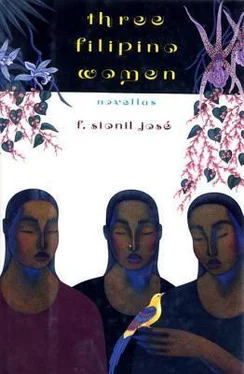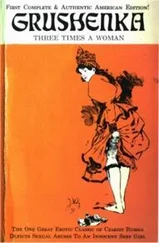Francisco Jose - Three Filipino Women
Здесь есть возможность читать онлайн «Francisco Jose - Three Filipino Women» весь текст электронной книги совершенно бесплатно (целиком полную версию без сокращений). В некоторых случаях можно слушать аудио, скачать через торрент в формате fb2 и присутствует краткое содержание. Год выпуска: 2013, ISBN: 2013, Издательство: Random House Publishing Group, Жанр: Современная проза, на английском языке. Описание произведения, (предисловие) а так же отзывы посетителей доступны на портале библиотеки ЛибКат.
- Название:Three Filipino Women
- Автор:
- Издательство:Random House Publishing Group
- Жанр:
- Год:2013
- ISBN:978-0-307-83028-9
- Рейтинг книги:4 / 5. Голосов: 1
-
Избранное:Добавить в избранное
- Отзывы:
-
Ваша оценка:
- 80
- 1
- 2
- 3
- 4
- 5
Three Filipino Women: краткое содержание, описание и аннотация
Предлагаем к чтению аннотацию, описание, краткое содержание или предисловие (зависит от того, что написал сам автор книги «Three Filipino Women»). Если вы не нашли необходимую информацию о книге — напишите в комментариях, мы постараемся отыскать её.
and
-examine the Philippine experience through the lives of three female characters, a prostitute, a student activist, and a politician.
Three Filipino Women — читать онлайн бесплатно полную книгу (весь текст) целиком
Ниже представлен текст книги, разбитый по страницам. Система сохранения места последней прочитанной страницы, позволяет с удобством читать онлайн бесплатно книгу «Three Filipino Women», без необходимости каждый раз заново искать на чём Вы остановились. Поставьте закладку, и сможете в любой момент перейти на страницу, на которой закончили чтение.
Интервал:
Закладка:
I could not speak.
“It is for the best, Roly,” she said. “For both of us. For you … and your morality. It will mean that you are finally free of me. Can’t you see? For me, it will be a beginning …”
“We must live with the past,” I said, suppressing the tremor in my voice.
“I know,” she said. “And we must also forget it. Andy wants to take me to America, make a home for him and raise his children. I saw a gynecologist last week. He said I could still bear half a dozen children if I wanted to. And that is what I will do. I will raise them in a happy home and will love them all I can …”
I pressed her hand. I didn’t want to but I understood.
I remembered when she asked me if she looked like a prostitute and how I felt then, how I wanted to be one with her.
“I wish you the best …” I said, even as tears blurred my eyes. But she did not see them for she embraced me then and started to cry, her heart thrashing against my chest. It was the last time I would hold her.
“All the men I had, the boyfriend-boyfriends, I never felt anything for them. I don’t love Andy, Roly. But perhaps, in time, I will. It was you all the time, the first …”
I tried to push her away, to look at the precious face but she would not let me. My cheeks were soon wet with her crying.
“Can you imagine how long it has been?” she asked. “So now, I know what love is. When you said you wanted a relationship that was not plastic, I did not understand. I do now. I have never apologized to any man. Now, I will say to you—” she kissed me softly—“please forgive me …”
Leaving Cubao at dusk, the heat of April melting my bones, I really had nowhere to go. I was happy for Ermi. Perhaps, this is what love has always been, whether it is for a woman or for a cause — the readiness to give and not ask for anything in return, the unquestioning willingness to lose everything, even if that loss is something as precious as life itself.
“What is death?” she had once asked. “You die once and you will not die again …”
Remembering this, I know how it would be for me. I would return to the old apartment in Mabini and if I could not sleep, I would probably walk over to Camarin. Ralph, the pianist had retired; a son had taken him back to Agusan. Where the piano used to stand they have set up a booth for their stereo system. The bar had deteriorated since Didi migrated to the United States and they no longer had Jack Daniels black. I would probably order a beer and squid roasted in that open grill, then watch Gloria finish her routine. She is buxom like a Rubens girl, she gyrates her hips in a naughty, lascivious way.
After Camarin, I would go to the Luneta and get a bit of salt air in my lungs. I would wait for the night to deepen then return to my apartment and lie down on that wide and empty bed. I would imagine Ermi as it was the night she stormed in. I can still see her even now bending over me, her hair a tumble on my face, her breath warm and sweet. But did she really care? I had asked her to be kind when the moment for my execution came, that she make it swift. I will always languish in her final judgment about how I sold myself. She was right, of course, but it was not just myself that I had sold. And though I will not admit it to anyone, ever, I know that I sold my country, too — I, Rolando Cruz, former guerrilla officer, historian. What have I done to rationalize this treason? They used me — the gnomes of Wall Street and Marunouchi. I did their bidding willingly, eagerly, for I wanted a life that would not be marred by the early hunger that I had known. I had gotten more than food, but now, it was not only Ermi whom I had lost. What will she take of me from this Ermita that had been my perdition and her beginning? I don’t even have her picture. And knowing that what should be must be, I will probably be wracked by this pain which not even morphine can allay, and when it will finally become intolerable, I will probably go to the compartment under my bookshelf, take out the old forty-five kept from my days in Kiangan, then level it at my head.
Baguio, May 29, 1980.
PLATINUM
ONE
It is difficult for me to relate this story because it concerns a woman for whom I have always had the deepest affection. Also because it concerns me and the dilemmas that I had to face, not in our relationship, but in the very probing questions she had raised, not so much by what she asked as by the way she had lived.
I am convinced that I loved her as I had never loved anyone. If I did leave my easy life to be with her in the end as I told her I would, it was because of her. I know now that she was right and yet, I have not really changed. Is it because I am a coward? Too much a creature of habit, of comfort? Or — and I don’t want to answer this question — did I really love her enough?
Every day, I go through the numbing monotony, doing what I have been doing for the last six years. I have prospered by any measure in spite of inflation, the energy crisis, and all those pernicious dislocations that threatened business under martial law. And still I persist although no longer believing in what I am doing. Why then? For the family tradition? Out of momentum or plain, cussed stubbornness?
But I am young and there is time ahead.
Is it because I don’t want to stake my life in a venture which may not bring forth the justice Malu had searched for? I don’t want to think anymore. My mind is in turmoil and I wish Malu were here to confirm me.
I met Malu — short for Maria Luisa — in my senior year when I was contributing to the college journal. I was majoring in business and economics, but I had dabbled in sociology. Thinking about it now, Malu must have regarded me as an incorrigible rightist. I was about to leave the office of Professor Galvez, having submitted a twenty-page manuscript on the multinational corporations and how they were plundering Mindanao, when she came in.
She was tall — almost as tall as I — very fair, and slim. Her hair was neatly combed, hanging loose over her shoulders. She did not have a bit of makeup. But even without cosmetics, her face seemed aglow — that was the first thing one noticed about Malu. She had high cheekbones, full lips, and eyes that shone. Her chest was almost flat, and a fine down covered her arms.
Professor Galvez, who was the journal’s editor, attended to her at once. “Ah, Malu, I suppose you’ve already finished the piece. About time we had something spiritually lifting in this arid little journal.”
Her face was mobile; she was plainly peeved.
“Your article on faith healing and spirits,” Professor Galvez went on blithely, “should really make the next issue more interesting.”
“That is what I came to tell you, sir.” Her voice was mellow. “I’m hesitant about it. I wrote it in the first person and it doesn’t have the objectivity you demand.”
Professor Galvez had a Ph.D. in clinical psychology. He was also an excellent writer. In his late forties, his hair had turned prematurely gray and he looked venerable. “Well, isn’t that the best way to handle something that cannot be explained in the usual scholarly fashion? But we can always break ground the way Carlos Castañeda does.”
Again, the displeasure on her face which the professor missed entirely.
We went out together. I wanted to know her more and what she was doing. She was free the rest of the morning so we went to the cafeteria for coffee.
I was pretentious then, going on pompous. I believed in economic nationalism and was researching the policies of government that were inimical to our interests. It was 1970 and though I did not agree with the student demonstrators and their lofty, radical slogans, I sympathized with their objectives. Malu told me later that I was just expressing the “constipated” view of the nationalist bourgeoisie which wanted the whole cake for itself.
Читать дальшеИнтервал:
Закладка:
Похожие книги на «Three Filipino Women»
Представляем Вашему вниманию похожие книги на «Three Filipino Women» списком для выбора. Мы отобрали схожую по названию и смыслу литературу в надежде предоставить читателям больше вариантов отыскать новые, интересные, ещё непрочитанные произведения.
Обсуждение, отзывы о книге «Three Filipino Women» и просто собственные мнения читателей. Оставьте ваши комментарии, напишите, что Вы думаете о произведении, его смысле или главных героях. Укажите что конкретно понравилось, а что нет, и почему Вы так считаете.












